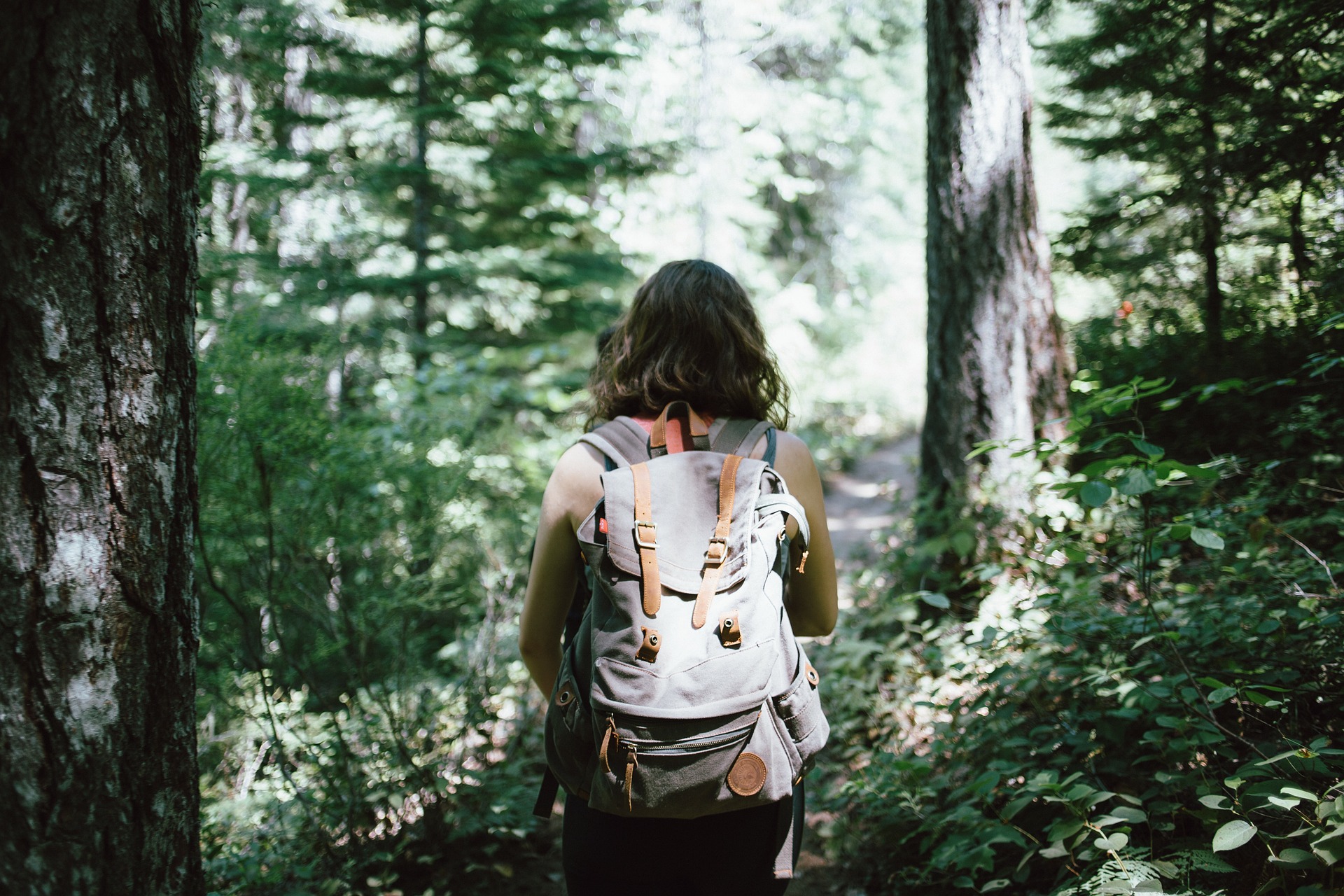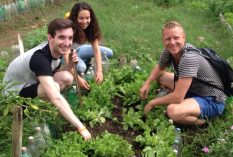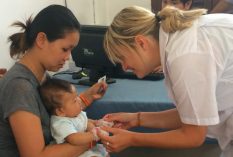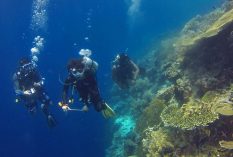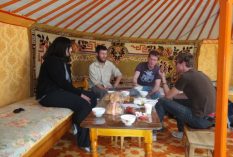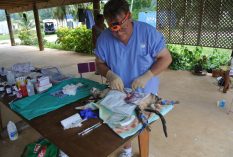Christmas is just around the corner and for some of us that usually involves some last-minute desperate shopping for stocking fillers. Whether you are trying to find gifts for your avid traveller-friend or perhaps for yourself, we’ve gathered some top gift ideas for the eco-conscious traveller.
Travel in itself isn’t the most environmentally friendly pursuit. Getting on a plane ups your carbon footprint by an uncomfortable sum. And yet travel, in all its many forms is a powerful force for change, including environmental issues. Perhaps your daughter, classmate or cousin are heading to Nicaragua or Indonesia to learn more about permaculture and finding new ways that we can all mutually continue living on this planet without exhausting all of our resources.
So what you can you do mitigate the negative effects of travel? Well, besides paying to carbon offset your flights, you might want to start with your backpack and what goes in it, as it will have a very direct impact on how you (or your cousin) behave and impact your environment on the road. So without further ado, these are our top 10 stocking fillers for the eco-conscious traveller!
Luggage to love
Not technically stocking-filler sized, but if you travel and aren’t the truly ascetic type, you will likely have to start with a bag of some kind to put your clothes and gear in. Depending on who you are, where you are going and on what kind of trip, there is an endless option of luggage. But not all are created equal. Some are created using only or mostly recycled material and this is where you should aim. Also look for brands using non-toxic materials and avoiding plastic. Timbuk2 makes nifty bags using recycled PET from plastic bottles and even recycles your bag when you’re done with it.
Water purifiers
Using old plastic bottles to make bags is a great idea to get rid of some of the 50 billion plastic water bottles that Americans alone go through each year. Another is to not contribute to the use of plastic bottles at all. Enter the Steripen and the LifeStraw. Both are devices which purify water into a potable drink, though with slightly different modes. The LifeStraw acts as a filter, and functions like…well, a straw! The Steripen uses ultraviolet light to purify water in a container such as a reusable water bottle. Unlike the LifeStraw, the Steripen also filters out viruses in addition to water-borne bacteria and protozoa, making it ideal to take on travels to far-flung places where it generally isn’t safe to drink tap water. Not only will you save quite a bit of money not buying plastic bottles every day, you will set an example for other travellers and of course, keep some of those plastic bottles from polluting every corner of our planet.
Reusable straws
Another scourge of the road and indeed everyday life is the ever-present plastic straw, which apparently has to accompany any kind of drink, anywhere. Do you bit and get a reusable straw to carry with you. It weighs next to nothing, takes up very little space and saves the use of one-time-only straws which most of the time end up in the sea, where they are a serious hazard to both birds, marine mammals and fish. Not to mention they never actually go away; when they eventually disintegrate into tiny microparticles, this minuscule plastic debris finds its ways into the bellies of fish and eventually into yours. Reusable straws is a growing industry and you can now find them in an array of materials, from bamboo to metal to glass. You can even find them with a bit of bling if that’s how you roll.
Ditch the packaging – solid shampoo!
Continuing on with reasons to switch from plastic we arrive at your toiletry bag. At the very least, get some reusable travel bottles and refill whenever necessary instead of buying new travel size single use containers of shampoo and body wash. Next step is to fill your bag with products not using any packing material at all. Sounds a bit impossible when we are talking about lotions and potions but the clever people at Lush have made it all possible. Pack some solid shampoo and deodorant and wave goodbye to plastic landfill! If you want to take it even further, consider going all DYI – great for your hair and great for the environment!
(Really) Reef-friendly sunscreen
Another item to be found in toiletry bag is sunscreen – at least if you or the person you’re buying for are heading anywhere sunny, which, let’s face it, is mostly anywhere. So what’s bad about sunscreen? Well, for starters most sunscreen contains a lot of chemicals such as oxybenzone, parabens and other nasty things, which you might question if you really want to slather your skin with on a daily basis. But the real reason here actually has to do with where all those chemicals go when they leave your skin, having done their bit to protect you from harmful rays. Whether you rinse them off in the shower or gradually as you swim around in some azure sea, all of these chemicals have a profoundly negative effect on marine life and especially on corals. To add to the problem, many brands advertise as ‘coral-safe’ but still contain the above ingredients. Read the labels! Stream2Sea make a good range of biodegradable and reef-friendly products, so you can be a happy fish.
Go full on Diva
This one is for ladies only, but it’s a good one. Any girl worth her travelling salt has surely spent some time agonising how to fit 6 months supply of tampons into her bag and still have room for that second bikini. Apart from taking up valuable luggage space, it goes without saying that tampons, applicators and their packing create mountains of waste every year. Enter the Diva Cup or the Moon Cup. Essentially what it says on the tin, menstrual cups are made of soft silicone and are reusable for years with the right care. Granted, they do take some practice to get used to, but you’ll thank us the next time you are in the back of beyond somewhere in South East Asia and there isn’t a tampon within 500 miles. Not to mention all that money you’ll save too. A win for your wallet, and a win for the environment!
Nature-friendly soap
Staying with hygiene and the idea of travelling rough, you will most likely be faced with the task of hand washing most if not all of your clothes for any duration of time, especially if you are heading out on some of the more rural internship placements. While a sink and a plug will do great for the most part, pay some thought to the detergent you use. Most household brands contain lots of chemicals better left out of nature, especially in countries with questionable sewage systems. Throw in some eco-friendly soap or detergent and you’re good to go. And for those really out of the way trips where you might not even have access to a sink, there’s always the Scrubba to act as your personal little washing machine, all powered by you!
Ditch the fleece – buy bamboo!
There are of course also eco-conscious choices to be made when it comes to those clothes you will eventually end up scrubbing free of roadside dirt. While the fleece has been a steady travel stalwart for decades, the travelling eco-warrior should steer clear. This is because even though some fleece material is technically made from recycled plastics, those same plastics get released from your garment, every time you wash it and end up polluting streams, rivers and seas. Luckily, fleece isn’t the only lightweight and soft material out there. Clothes made out of bamboo tick both these boxes, with the added bonus of being entirely organic and made from a material that grows incredibly fast, making it very sustainable. For great lines of lovely, soft eco-conscious bamboo outfits, check out BAM and Braintree. Using bamboo instead of heavily pesticide-dependent cotton is however a growing trend, so keep an eye out for new brands!
Solar-panel selfie power
Of course, clothes and hygiene aren’t the only areas where you can go on an eco-crusade. Unless you (or the person you are gifting) are some kind of digital recluse, chances are you will be bringing at least one digital item and that will need power. Quite aside from the difficulty of finding cheap digs with more than one power outlet, if you are heading out on a more rustic trip you may want a more reliable way of charging up that phone so you can upload that selfie. Consider bringing a solar panel, which these days come in all sorts of shapes and price classes. We like GoalZero, but there are many choices, just take your pick and get charged up whenever the sun’s up!
Bags for life
Many of these gift ideas revolve around avoiding the use of plastic. Perhaps no plastic item is more prevalent than the plastic bag. It is estimated that the global population use around 500 billion plastic bags every year. Most of those are single use, but unfortunately, that doesn’t stop them from being around for a long, long time. A very large part of them ends up in the ocean, where they cause painful deaths to all manner of marine life. Fortunately for you and your Christmas shopping, a reusable bag can be bought for a very small penny and last for a very long time. You can pick them up in almost any shape, colour and material so let your imagination run wild! If you want to pick up extra eco-warrior points, get a back made from recycled plastic bottles, like the ChicoBag.
So there you have it. Being an eco-conscious traveller is a piece of cake with all these great gadgets to help reduce your climate impact. And in the long run, your wallet will thank you, but not nearly as much as future generations and the environment through which we all travel.
Know of any more green travel gadgets we missed? Let us know in the comments!
Global Nomadic offers 50+ Professional Internships, Volunteer Projects and TEFL Programmes in 30+ countries worldwide. With a bag full of eco-conscious gear, are you ready to meet the world?

